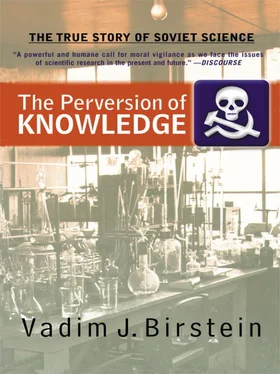The arrest of Vavilov in 1940 was approved at the highest state level. On July 16, 1939, only a couple of months after Lysenko, Tsitsin, and Stalin himself became academicians, NKVD commissar Lavrentii Beria in an official letter addressed to Chairman of the Council of Commissars Vyacheslav Molotov asked for permission to arrest the scientist:
The NKVD has reviewed the materials about the fact that after T. D. Lysenkowas appointed President of the Academy of Agricultural Sciences, N. I. Vavilov and the bourgeois school of so-called “formal genetics,” which he heads, organized a systematic campaign aimed to discredit Lysenkoas a scientist…. That is why I ask for your approval to arrest N. I. Vavilov. 55
Beria’s arrest of Vavilov was directly related to Stalin’s personal interest in Lysenko, his “theories,” and his fight against Vavilov. Less than a year before Vavilov’s arrest, on November 20, 1939, Stalin sent for Vavilov. The meeting was scheduled for 11:00 P.M. However, the dictator forced Vavilov to wait until 2:00 A.M. This was their last meeting. Stalin was very rude toward Vavilov during the conversation: “Well, citizen Vavilov, how long are you going to go on fooling with flowers and other nonsense? When will you start raising crop yields?” Vavilov tried to describe the importance of basic science for “raising crop yields.” The dictator interrupted him: “You may go.” 56Apparently, this conversation sealed Vavilov’s fate and Stalin ordered Beria to act.
Evidently, the review Beria mentioned meant a special report prepared by Bogdan Kobulov, at the time head of the NKVD Main Economic Directorate. According to materials on the official FSB web site, this directorate was established within the VCheKa on January 21, 1921, and after the reorganization of the VCheKa in 1922, became a directorate within the OGPU. 57By 1923, 75 percent of all institutions in the country were under the secret control of this directorate. The first known OGPU detailed information about the “counterrevolutionary ramified network of Vavilov,” prepared by the Eighth Department of this directorate and signed by its head, Lev Mironov, was dated March 14, 1932. 58
In 1934, the Economic Department became a part of the Main Directorate of State Security (GUGB) within the NKVD, but in 1936, in Yezov’s NKVD, it was merged with the GUGB Counterintelligence Department. 59In 1938, under Beria, the Main Economic Directorate (GEU) for “fighting against sabotage and wrecking in the people’s industry and agriculture” became a separate unit within the NKVD, and Kobulov was appointed its head. Kobulov’s report on Vavilov was entitled “The Campaign Waged by Reactionary Scholars Against Academician T. D. Lysenko.” 60Vavilov and his teacher, Academician Dmitrii Pryanishnikov, were named in it as “defenders of genetics against Lysenko’s attacks” who were “trying hard to discredit Lysenko as a scholar.” The report also included a list of other opponents of Lysenko, beginning with the name of the botanist and president of the academy, Vladimir Komarov.
It is evident now that the GEU and not the GUGB, which was in charge of political cases, collected materials for the future Vavilov case. From September 4, 1939, until the division of the NKVD into two institutions—the NKVD and the NKGB—on February 3, 1941, there were two separate NKVD Investigation Departments within the GUGB and GEU. The GEU was kept at the NKVD until April 1943, when it became a part of the NKGB Second Directorate. 61
Apparently, Molotov sanctioned the arrest of Vavilov, because on August 6, 1940, Beria approved the “Order [Warrant] for Arrest” issued for Vavilov. 62On August 7, 1940, the warrant was also approved by USSR deputy general prosecutor G. Safonov. The warrant was prepared by NKVD officer V. Ruzin (head of the Third Division of the GEU Third Department) and signed by two of his supervisors, Stepan Reshetnikov and Bogdan Kobulov. It was dated August 5, 1940.
The warrant stated that “from the first days of [the existence of] the Soviet Union N. I. Vavilov was against the current [political] regime and expressed slander [regarding] leaders of the Party and Soviet Government.” 63One of the main accusations was that Vavilov was allegedly connected with the so-called Labor Peasant Party (TKP), one of the OGPU’s fabrications. Many outstanding Russian agricultural scientists, such as the well-known economists Nikolai Kondratiev and Aleksandr Chayanov, were arrested by the OGPU between 1930–1933 for being TKP “members.” According to the OGPU’s fantasy, the TKP consisted of 200,000 members, and 1,000 people were arrested for allegedly being a part of this fictional group. The development of the TKP case was under Stalin’s personal supervision. He read the OGPU reports and transcripts of interrogations and wrote directions to the OGPU chair Menzhinsky and then Yagoda. 64He ordered Menzhinsky: “Run Messrs. Kondratiev, Yurovsky [an arrested member of the Finance Commissariat], Chayanov, etc. through the [OGPU] mill.” 65
According to Stalin, the TKP was a branch of a widespread plot that included other groups of “wreckers” who were convicted during other show trials (the Promparty case, Torgprom case, and the like). The plot was supposedly controlled from abroad by Russian emigrants. 66The arrested “TKP members” were condemned to various terms of imprisonment in labor camps or were exiled. Later, in 1938, most of them were shot. On July 16, 1987, the Soviet Supreme Court rehabilitated Chayanov, Kondratiev, and a number of other scientists and stated that the TKP never existed in reality. 67
My grandfather, the agronomist Georgii Luppo, was among those arrested. Despite torture, he did not sign false testimony until the OGPU investigators threatened to arrest his daughter (i.e., my mother) and give her to the OGPU soldiers. Such cases are documented. When Stanislav Kossior, the deputy chair of the Sovnarkom and Politburo member, was arrested in 1938 and refused to sign a false testimony written by the NKVD interrogators, his sixteen-year-old daughter was brought to Lubyanka for an “investigation” and raped by the NKVD interrogators in the presence of her father. She committed suicide immediately after this “interrogation.” 68 My grandfather was never allowed to return to Moscow after he served his term in one of the northern labor camps. He died in 1941 of a heart attack after a new round of interrogations at the NKVD.
Some of the arrested scientists, evidently after torture, gave testimonies against Vavilov. The warrant mentioned four scientists: the cytologist Nikolai Avdulov (1899–1938), the VIR’s employee Kuleshov, the plant breeder Viktor Talanov (1871–1938), and the plant breeder and geneticist Viktor Pisarev (1882–1972). 69Avdulov worked at the VIR from 1928–1932 and was arrested twice, in 1932 and 1937. He died in imprisonment. A corresponding member of the academy (elected in 1931), Talanov worked at the VIR from 1926–1931 and was arrested for the first time in 1931. Later, after he was arrested for the third time, he died in prison. Finally, Pisarev, who was director of the VIR Central Genetics and Selection Experimental Station near Leningrad from 1923 to 1933, was arrested in 1933. He was released and in 1934 continued to work at the VIR. Later on, Pisarev worked at the Scientific Research Institute of Agricultural Sciences.
The NKVD warrant for Vavilov stated:
After the arrest of the main functionaries of the TKP, VAVILOV did everything possible for their [i.e., the TKP members’] rehabilitation. He took petitions from the accused and their wives and wrote appeals stating the innocence of the arrested. He handled a list of the 44 arrested persons whom he considered should be released to [Commissar of Agriculture Yakov] Yakovlev, who later was arrested as an enemy of the people. 70
Читать дальше











